
Berlin is the capital and largest city of Germany by both area and population. Its more than 3.85 million inhabitants make it the European Union's most populous city, according to population within city limits. One of Germany's sixteen constituent states, Berlin is surrounded by the State of Brandenburg and contiguous with Potsdam, Brandenburg's capital. Berlin's urban area, which has a population of around 4.5 million, is the most populous urban area in Germany. The Berlin-Brandenburg capital region has around 6.2 million inhabitants and is Germany's second-largest metropolitan region after the Rhine-Ruhr region.

Germany, officially the Federal Republic of Germany, is a country in the western region of Central Europe. It is the second-most populous country in Europe after Russia, and the most populous member state of the European Union. Germany is situated between the Baltic and North seas to the north, and the Alps to the south. Its 16 constituent states are bordered by Denmark to the north, Poland and the Czech Republic to the east, Austria and Switzerland to the south, and France, Luxembourg, Belgium, and the Netherlands to the west. The nation's capital and most populous city is Berlin and its main financial centre is Frankfurt; the largest urban area is the Ruhr.

German is a West Germanic language mainly spoken in Western Europe and Central Europe. It is the most widely spoken and official or co-official language in Germany, Austria, Switzerland, Liechtenstein, and the Italian province of South Tyrol. It is also an official language of Luxembourg and Belgium, as well as a recognized national language in Namibia. Outside Germany, it is also spoken by German communities in France (Alsace), Czech Republic, Poland, Slovakia, and Hungary (Sopron).

The German Empire, also referred to as Imperial Germany, the Second Reich, or simply Germany, was the period of the German Reich from the unification of Germany in 1871 until the November Revolution in 1918, when the German Reich changed its form of government from a monarchy to a republic.
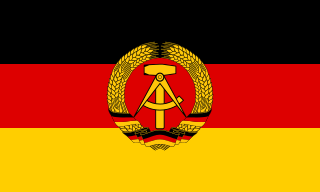
East Germany, officially the German Democratic Republic, was a country in Central Europe that existed from its creation on 7 October 1949 until its dissolution on 3 October 1990. Until 1989, it was generally viewed as a communist state, and it described itself as a socialist "workers' and peasants' state". Before its establishment, the country's territory was administered and occupied by Soviet forces with the autonomy of the native communists following the Berlin Declaration abolishing German sovereignty in World War II; when the Potsdam Agreement established the Soviet-occupied zone, bounded on the east by the Oder–Neisse line. The GDR was dominated by the Socialist Unity Party of Germany (SED), a communist party from 1949 to 1989, before being democratized and liberalized under the impact of the Revolutions of 1989 against the communist states, helping East Germany be united with the West. Unlike West Germany, SED did not see its state as the successor of the German Reich (1871–1945) and abolished the goal of unification in the constitution (1974). Under the SED rule, GDR was often judged as a Soviet satellite state; most scholars and academics described it as a totalitarian regime.

Nazi Germany, officially known as the German Reich until 1943, later the Greater German Reich, was the German state between 1933 and 1945, when Adolf Hitler and the Nazi Party controlled the country, transforming it into a totalitarian dictatorship.
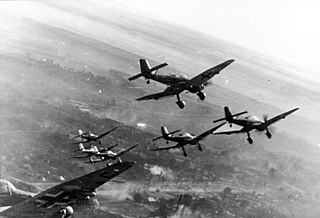
World War II or the Second World War, often abbreviated as WWII or WW2, was a global conflict that lasted from 1939 to 1945. The vast majority of the world's countries, including all of the great powers, fought as part of two opposing military alliances: the Allies and the Axis. Many participants threw their economic, industrial, and scientific capabilities behind this total war, blurring the distinction between civilian and military resources. Aircraft played a major role, enabling the strategic bombing of population centres and the delivery of the only two nuclear weapons ever used in war. World War II was by far the deadliest conflict in history, resulting in an estimated 70 to 85 million fatalities, mostly among civilians. Tens of millions died due to genocides, starvation, massacres, and disease. In the wake of Axis defeat, Germany, Austria and Japan were occupied, and war crimes tribunals were conducted against German and Japanese leaders.

Fußball-Club Bayern München e. V., also known as FC Bayern, Bayern Munich, or simply Bayern, is a German professional sports club based in Munich, Bavaria. It is best known for its professional men's association football team, which plays in the Bundesliga, the top tier of the German football league system. Bayern is the most successful club in German football history, having won a record 33 national titles, including 11 consecutively since 2013, and 20 national cups, along with numerous European honours.

The Bundesliga, sometimes referred to as the Fußball-Bundesliga or 1. Bundesliga, is a professional association football league in Germany. At the top of the German football league system, the Bundesliga is Germany's primary football competition. The Bundesliga comprises 18 teams and operates on a system of promotion and relegation with the 2. Bundesliga. Seasons run from August to May. Games are played on Fridays, Saturdays and Sundays. All of the Bundesliga clubs take part in the DFB-Pokal cup competition. The winner of the Bundesliga qualifies for the DFL-Supercup.
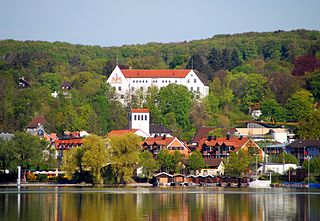
Starnberg is a German town in Bavaria, Germany, some 30 kilometres (19 mi) southwest of Munich. It is at the north end of Lake Starnberg, in the heart of the "Five Lakes Country", and serves as capital of the district of Starnberg. Recording a disposable per-capita income of €26,120 in 2007, Starnberg regained its status as the wealthiest town in Germany.

Adolf Hitler was an Austrian-born German politician who was the dictator of Germany from 1933 until his suicide in 1945. He rose to power as the leader of the Nazi Party, becoming the chancellor in 1933 and then taking the title of Führer und Reichskanzler in 1934. During his dictatorship, he initiated World War II in Europe by invading Poland on 1 September 1939. He was closely involved in military operations throughout the war and was central to the perpetration of the Holocaust, the genocide of about six million Jews and millions of other victims.

World War I, often abbreviated as WWI, was a global conflict fought between two coalitions, the Allied Powers and the Central Powers. Fighting took place throughout Europe, the Middle East, Africa, the Pacific, and parts of Asia.
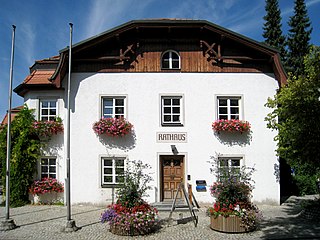
Seefeld is a municipality in the district of Starnberg in Bavaria, Germany. The town lies on the western shore of the Pilsensee. It is connected to the Bavarian capital city of Munich by the S-Bahn line S8. Seefeld is notable for the Seefeld Castle, a seat of the Toering noble family of Bavaria.
Clemens Erwein Heinrich Karl Bonaventura Freiherr von und zu Franckenstein was a German opera composer who is studying in Vienna, Austria, and later in Munich, Germany, with Ludwig Thuille and at the Hoch Conservatory in Frankfurt with Iwan Knorr. After a visit to th,e USA he conducted the Moody-Manners Opera Company, acted from 1902–1907 as opera conductor in London, then worked at the court theatres of Wiesbaden and Berlin, until the court theaters were abolished after the First World War. He was the last royal general director of the Bayerische Staatsoper in Munich and the only one who exercised this office twice. He produced the Munich Opera Festival through 1934 when he was forced out by Nazi prohibitions.
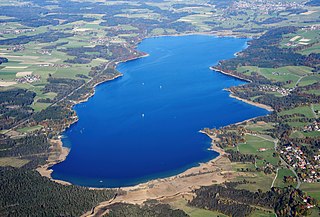
Simssee is a lake in the Alpine foothills, Bavaria, Germany. At an elevation of 470.1 metres, its surface area is 6.5 km² making it the largest lake in the Rosenheim district. The maximum depth of the lake is 22.5 m. It drains into the river Sims. The retention period of the Simssee is about one and a half years and its catchment area covers 59.51 km².

Austria, formally the Republic of Austria, is a landlocked country in Central Europe, lying in the Eastern Alps. It is a federation of nine provinces, one of which is the capital, Vienna, the most populous city and province. Austria is bordered by Germany to the northwest, Czechia to the north, Slovakia to the northeast, Hungary to the east, Slovenia and Italy to the south, and Switzerland and Liechtenstein to the west. The country occupies an area of 83,871 km2 (32,383 sq mi) and has a population of 9 million.
The Fünfseenland is the name for an area in Upper Bavaria between, and including, the Ammersee and Starnberger See, which contains the remainder of the great glacial lakes of the area.

Seefeld Castle is a castle in Seefeld, Bavaria that has its origins in a 13th-century building but has since been extensively modified. Today it serves in part as a museum. A large park extends to the south of the castle.

Seefeld-Hechendorf station is a railway station in the municipality of Seefeld, located in the Starnberg district in Upper Bavaria, Germany.


















